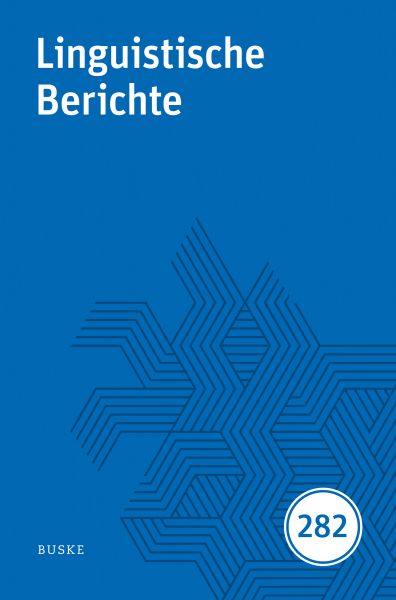Linguistische Berichte Heft 282
Beiträge aus Forschung und Anwendung – Miriam Brinkmann, Antonia Fünter, Laura d'Aurizio & Natascha Müller: Die Repräsentation von Genus im Französischen: Psycholinguistische Evidenz für ein dreigliedriges System Abstract: Previous studies generally considered grammatical gender in French as a binary system, con-sisting of a masculine and a feminine gender, both reflected beyond the nouns themselves on e. g. determiners and adjectives. However, a glance at the French system reveals that the exist-ence of two forms does not provide adequate evidence for the assumption of a bipartite under-lying system (Loporcaro 2020) and that there is still evidence for inflectional classes in French as well (Lowenstamm 2012). The present study considers the possibility of a tripartite gender system in French by taking into consideration the results of two psycholinguistic experiments. The first experiment indicates that French native speakers process feminine nouns faster and more accurately than masculine nouns. Since this result is surprising, former Latin neuter nouns were selected from the masculine nouns of the first experiment and considered as a separate group in a second experiment. This group of nouns is processed significantly longer and less accurately than feminine nouns and the remaining masculine nouns. The results of these experiments allow the discussion of which form should be considered marked in the French system and of why the tripartite gender system of Latin survived in nowadays French. Moreover, the notion of default as well as the role of a default gender in language processing are discussed. Considering the French tripartite gender system as proposed in Lowenstamm (2008) in the framework of the epigenetic model by Biberauer, Holmberg, Roberts and Sheehan (2014), a parametric description of language change is proposed. The results of the current study allow a new perspective on the French gender system and provide insights into the role of the grammatical gender and inflectional class features in French. – Kalle Glauch: Expressive punctuation: how punctuation changes the perceived valence of discourse referents in computer-mediated communication Praktisches aus Forschung und Lehre Abstract: This article explores the role of five expressive punctuation marks – 'multiple exclamation marks' (!!!), 'exclamation mark' (!), 'full stop' (.), 'ellipsis' (...), and 'null punctuation' (ø) – as cues to writer attitudes in CMC. Specifically, it investigates how the underlying meaning of expressive punctuation influences the perceived emotional valence of discourse referents within exclamative constructions. In a 1x5 between-subjects repeated measures design, valence ratings were collected for 120 discourse referents embedded in exclamative constructions manipulated by message finale punctuation mark (e. g., 'What a view!!!/!/./…/ø') on a 1 (negative) to 9 (positive) scale. For inherently positive discourse referents, a clear positivity hierarchy in the overall valence of embedded discourse referents emerges, indicating a differential influence of punctuation on perceived valence: multiple exclamation marks > exclamation marks > null punctuation > full stop > ellipsis. For inherently negative discourse referents, the differences between the conditions are less distinct. Notably, only multiple exclamation marks yield a significantly lower valence rating within that range of values. While the findings for inherently positive referents align with prior assumptions on the expressive meaning of different punctuation marks in CMC, the observed pattern for inherently negative referents cannot be readily explained by existing literature on expressive punctuation in CMC.
weniger anzeigen expand_lessVersandkostenfreie Lieferung! (eBook-Download)
Als Sofort-Download verfügbar
- Artikel-Nr.: SW9783967699470110164
- Artikelnummer SW9783967699470110164
-
Mit
Markus Steinbach, Nina-Kristin Meister, Günther Grewendorf, Arnim von Stechow, Miriam Brinkmann, Antonia Fünter, Laura d'Aurizio, Natascha Müller, Kalle Glauch, Aleksandra Ćwiek, Susan Schlotthauer, Jana Eckardt
- Wasserzeichen ja
- Verlag Helmut Buske Verlag
- Seitenzahl 118
- Veröffentlichung 19.05.2025
- Barrierefreiheit
- ISBN 9783967699470
- Wasserzeichen ja

